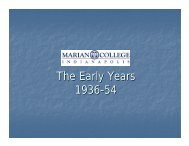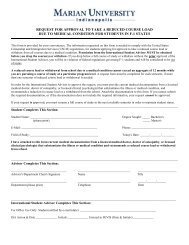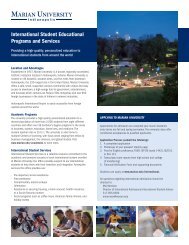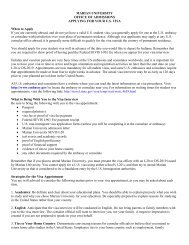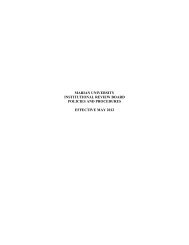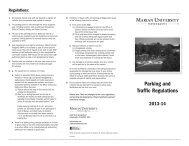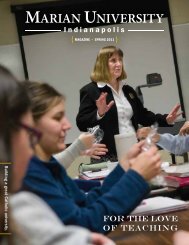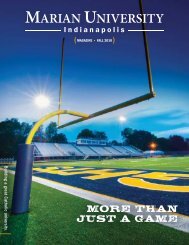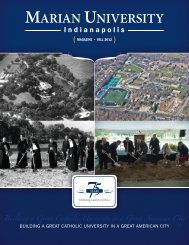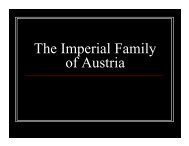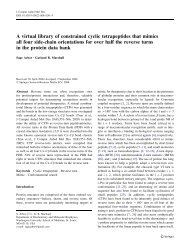2009-11 Marian University Course Catalog, fall 2010 edition
2009-11 Marian University Course Catalog, fall 2010 edition
2009-11 Marian University Course Catalog, fall 2010 edition
You also want an ePaper? Increase the reach of your titles
YUMPU automatically turns print PDFs into web optimized ePapers that Google loves.
curriculum are also addressed. The course includes a<br />
kindergarten practicum and a service learning experience.<br />
(SEM)<br />
EDU 315<br />
Differentiated Strategies<br />
for Teaching and Learning 3 credits<br />
Prerequisite: Successful completion of Phase I. The course<br />
explores multiple ways of organizing curriculum and assessing<br />
and instructing children. Styles of learning, multiple<br />
intelligences, differentiated instruction, formal and informal<br />
assessment strategies, and use of state standards as part of<br />
the planning model are components of this course. (FAL)<br />
EDU 318<br />
English Language Learners<br />
in Mainstream Classroom 3 credits<br />
Prerequisite: Permission. See EDU 518. (SUM)<br />
EDU 325<br />
Teaching in a Diverse World 3 credits<br />
Prerequisite: Successful completion of Phase I. Corequisite:<br />
347. This course examines multicultural education curriculum<br />
and pedagogy. Students learn to plan and teach multicultural<br />
social studies units and lessons by integrating best practices<br />
with Indiana and national social studies standards. (SPR)<br />
EDU 328<br />
Best Practices in Teaching ENL 3 credits<br />
Prerequisite: 318 or permission. This course focuses on<br />
theory and practice in teaching English to students for whom<br />
English is not a native language. It provides an overview of<br />
historical and current approaches to teaching language,<br />
different contexts for language learning, and various<br />
materials available for teaching English. It provides<br />
opportunities for students to develop and demonstrate<br />
practical skills, gain hands-on experience, and review<br />
professional literature. (FAL)<br />
EDU 338<br />
Curriculum and Methods<br />
for Exceptional Needs 3 credits<br />
Prerequisites: 130, 233, and successful completion of Phase I.<br />
This course includes examination, discussion, evaluation, and<br />
use of the materials available in the inclusive classroom and<br />
in a resource room with children with exceptionalities. (SPR)<br />
EDU 339<br />
Curriculum and Methods:<br />
MS/HS Exceptional Needs 3 credits<br />
Prerequisites: 130, 233, and successful completion of Phase I.<br />
This course will assist students in developing and adapting<br />
the curriculum in order to meet the needs of children with<br />
exceptional needs in middle school and high school. Specific<br />
subject areas instructional methods and materials will be<br />
reviewed and general instructional strategies and student<br />
skills will be presented. (ADD)<br />
EDU 346<br />
Elementary Reading and Language Arts 4 credits<br />
Prerequisites: 130 or 230, PSY 220, and successful completion<br />
of Phase I. This course integrates reading and oral and written<br />
communication theory and teaching strategies in grades K-6.<br />
The course includes study of skills and strategies, methods of<br />
teaching, materials and resources, and evaluating and<br />
organizing to meet students’ individual needs. A practicum is<br />
required for this course. (FAL)<br />
EDU 347<br />
Elementary Reading and<br />
Children’s Literature 5 credits<br />
Prerequisites: 346 and successful completion of Phase I.<br />
Corequisite: 325. This course integrates elements of reading<br />
and the study of children’s literature. The course includes<br />
diagnosis and techniques for assisting children with reading<br />
problems, use of diagnostic instruments, and remedial<br />
instruction. It also includes a focus on genres of children’s<br />
literature, selecting and evaluating and using children’s<br />
literary materials in and out of the classroom. A practicum is<br />
required for this course. (SPR)<br />
EDU 351<br />
Reading and Writing<br />
in the Content Areas 3 credits<br />
Prerequisite: Successful completion of Phase I. This course<br />
focuses on reading, writing, and study skills needed to teach<br />
content subjects in high schools. Strategies in using reading<br />
and writing for learning are covered. Pre-service teachers also<br />
learn to select and prepare reading materials consistent with<br />
the skill and maturity levels of students, support English<br />
language learners, and promote recreational reading. Field<br />
component includes a service project related to reading,<br />
writing, or study skills in which students can apply the<br />
knowledge, skills, and dispositions learned. (FAL)<br />
EDU 352<br />
Content Area Reading Seminar 1 credit<br />
Prerequisite: Successful completion of Phase I. Corequisite:<br />
346 or 351. The course emphasizes strategies for using<br />
reading and writing to teach and learn at the middle school<br />
level. Topics include assessment of middle school students’<br />
literacy abilities, readability analysis of text materials for<br />
middle school readers, knowledge of resources for adolescent<br />
recreational reading, and ways to work with school and<br />
community libraries to enhance middle school learning. This<br />
course is taken in conjunction with applicable area of<br />
education. (FAL)<br />
EDU 355<br />
Education Around the World 3 credits<br />
In this course, students will learn about educational systems<br />
in different countries. The cultural aspects of countries other<br />
than the United States, including social, political, cultural,<br />
historical, and economic aspects will be studied. This course<br />
88



